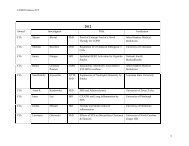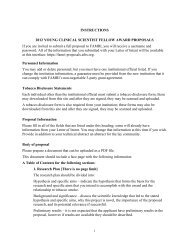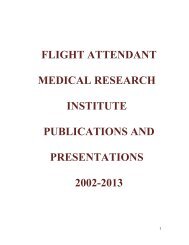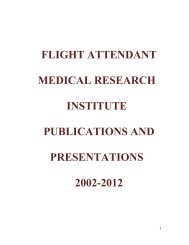MISSION
2009 compendium of FAMRI-supported research - Flight Attendant ...
2009 compendium of FAMRI-supported research - Flight Attendant ...
Create successful ePaper yourself
Turn your PDF publications into a flip-book with our unique Google optimized e-Paper software.
FAMRI Supported Publications<br />
Gibbs A, Schwartzman J, Deng V, Bagby G, Alumkal J. Sulforaphane destabilizes the androgen receptor<br />
and attenuates androgen receptor signaling in prostate cancer cells through inhibition of HDAC6.<br />
Presented at the 15th Annual Prostate Cancer Foundation Meeting. Incline Village, NV, Oct 15-18,<br />
2008.<br />
NDRG1 MODULATION TO DECREASE PROSTATE CANCER INVASION<br />
Sushant K. Kachhap, PhD; The Johns Hopkins University; YCSA 2007<br />
Increased tobacco smoke exposure positively correlates with an increased risk of metastasis, leading to a<br />
poor prognosis in a wide variety of cancers including those of lung, breast, and prostate cancer (PCa).<br />
Downregulation of the E-cadherin adhesion molecule is a common feature of a variety of metastatic<br />
epithelial tumors related to SHS. The N-myc downregulated gene 1 (NDRG1) is a known PCa metastasis<br />
suppressor gene. Apart from an alpha beta hydrolase motif the functionality of which remains questionable,<br />
NDRG1 lacks any known protein motif that can impart it a function. Dr. Kachhap and colleagues have<br />
recently elucidated the function of NDRG1 as a Rab4a effector protein that localizes to the trans Golgi<br />
network where it is involved with recycling of the E-cadherin molecule. Induction of NDRG1 leads to differentiation<br />
of PCa cells and decreases metastasis. Thus, it is hypothesized that the ability to pharmacologically<br />
control the expression of NDRG1 in PCa can potentially reduce invasion/metastasis of PCa. Their<br />
goal is to upregulate NDRG1 in PCa cells with small molecule compounds/drugs to decrease PCa invasion.<br />
Data from microarray analysis in PCA cells treated with histone deacetylase inhibitors (HDACi) indicated<br />
that NDRG1 upregulated by generic HDACis. They show that NDRG1 protein is expressed upon<br />
treatment of PCa cells DU-145 and LNCaP with generic HDACi. Using HDAC isotype-selective<br />
inhibitors supplied by MethylGene Inc., they further evaluated various histone deacetylases (HDACs) that<br />
regulate NDRG1 in these PCa cells. They found that NDRG1 is regulated specifically by an HDAC 1 and<br />
2 selective inhibitor and an HDAC 6 selective inhibitor, but not by an HDAC 8 selective inhibitor. By<br />
using small hairpin RNA for HDAC 1, HDAC 2, HDAC 4, HDAC 6, and HDAC 8 they have further<br />
confirmed that NDRG1 is specifically regulated by HDAC 1 and HDAC 6, and not other HDACs. They<br />
envisage NDRG1 as a pharmacologically anti-metastatic target that can be regulated for PCa. Knowledge<br />
pertinent to the role of specific HDAC isozymes regulating NDRG1 expression will help the rational<br />
development of such therapeutics, thereby decreasing PCa metastasis.<br />
FAMRI Supported Publications<br />
Kortenhorst MS, Zahurak M, Shabbeer S, Kachhap S, Galloway N, Parmigiani G, Verheul HM, Carducci<br />
MA. A multiple-loop, double-cube microarray design applied to prostate cancer cell lines with variable<br />
sensitivity to histone deacetylase inhibitors. Clin Cancer Res 2008;14:6886-6894.<br />
Shabbeer S, Sobolewski M, Anchoori RK, Kachhap S, Davidson N, Carducci MA, Khan SR. Fenugreek: a<br />
naturally occurring edible spice as an anticancer agent. Cancer Biol Ther 2009;8 [Epub ahead of print].<br />
CANCER, THYROID<br />
COMPLETED RESEARCH<br />
BRAF MUTATION AND OTHER COMMON GENETIC AND EPIGENETIC ALTERATIONS IN THYROID CANCER: RELA-<br />
TIONSHIP WITH SMOKING AND CLINICAL APPLICATIONS<br />
Michael M. Xing, MD, PhD; The Johns Hopkins University; CIA 2003<br />
The most common genetic and epigenetic alterations in thyroid cancer involve BRAF (Ras-regulated<br />
kinase) and Ras mutations and aberrant gene methylation. Smoking is linked with Ras mutation in other<br />
cancers, nodular goiter, and Grave’s disease. Both nodular goiter and Grave’s disease are associated with an<br />
increased risk of thyroid cancer. Dr. Xing and collaborators hypothesized that smoking may cause a higher<br />
incidence of certain genetic and epigenetic alterations, such as BRAF and Ras mutations and gene methylation<br />
in thyroid cancer leading to adverse pathological and clinical consequences. Aims of the study<br />
included 1) determining whether smoking causes a specific genetic/epigenetic alterations in thyroid cancer,<br />
such as BRAF and Ras mutations and gene methylation with predilection to a particular subtype and specific<br />
clinicopathological characters; and 2) applying genetic/epigenetic information to thyroid cancer diagnostic<br />
and prognostic evaluation.<br />
1 3 4 P A G E







